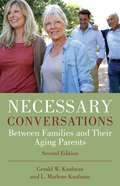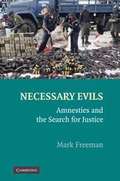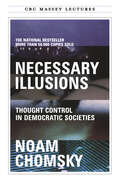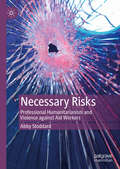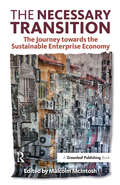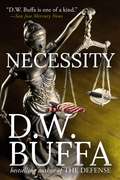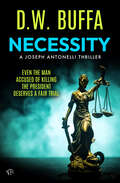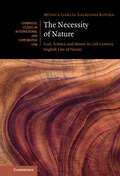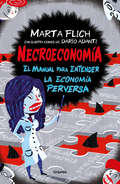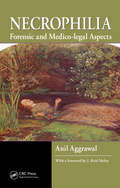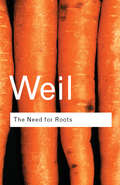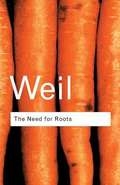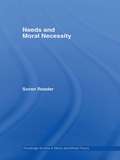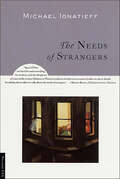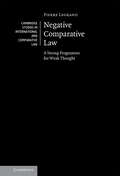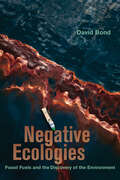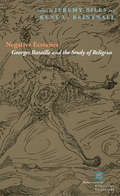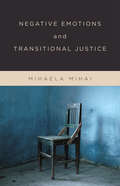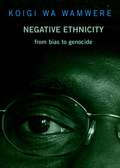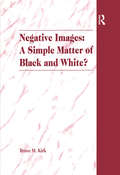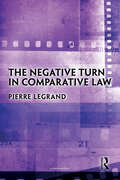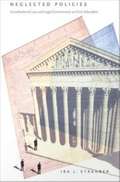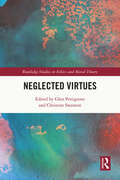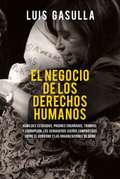- Table View
- List View
Necessary Conversations: Between Families and Their Aging Parents
by Gerald Kaufman L. Marlene KaufmanIn this timely book, long-time family counselors, Gerald and Marlene Kaufman, urge aging people, their adult children, family members, and other caretakers to talk directly with each other about the decisions that lie ahead as they age. "Do it before a crisis hits," say the Kaufmans. "A good time to start is when the parents retire."Necessary Conversations focuses on four primary areas:Parents' finances Parents' medical care Parents' living arrangements When to stop driving This honest and resourceful guide for aging adults and their family members includes helpful suggestions for starting these conversations and overcoming confrontation.
Necessary Evils
by Mark FreemanThis book is about amnesties for grave international crimes that are adopted by states in moments of transition or social unrest. The subject is naturally controversial, especially in the age of the International Criminal Court. The goal of this book is to reframe and revitalize the global debate on the subject, and to offer an original framework for resolving amnesty dilemmas when they arise. Most existing literature and jurisprudence on amnesties deal with only a small subset of state practice and sidestep the ambiguity of amnesty's position under international law. This book addresses the ambiguity head on and argues that amnesties of the broadest scope are sometimes defensible when adopted as a last recourse in contexts of mass violence. Drawing on an extensive amnesty database, the book offers detailed guidance on how to ensure that amnesties extend the minimum leniency possible, while imposing the maximum accountability on the beneficiaries.
Necessary Illusions: Thought Control in Democratic Societies (The CBC Massey Lectures)
by Noam ChomskyIn his national bestselling 1988 CBC Massey Lectures, Noam Chomsky inquires into the nature of the media in a political system where the population cannot be disciplined by force and thus must be subjected to more subtle forms of ideological control. Specific cases are illustrated in detail, using the U.S. media primarily but also media in other societies. Chomsky considers how the media might be democratized (as part of the general problem of developing more democratic institutions) in order to offer citizens broader and more meaningful participation in social and political life.
Necessary Risks: Professional Humanitarianism and Violence against Aid Workers
by Abby StoddardAttacks on humanitarian aid operations are both a symptom and a weapon of modern warfare, and as armed groups increasingly target aid workers for violence, relief operations are curtailed in places where civilians are most in need. This book provides an in-depth analysis of the challenges to humanitarian action in warzones, the risk management and negotiation strategies that hold the most promise for aid organizations, and an ethical framework from which to tackle the problem. By combining rigorous research findings with structural historical analysis and first-person accounts of armed attacks on aid workers, the author proposes a reframed ethos of humanitarian professionalism, decoupled from organizational or political interests, and centered on optimizing outcomes for the people it serves.
The Necessary Transition: The Journey towards the Sustainable Enterprise Economy
by Malcolm McIntoshLife on Earth for humanity and our ecosystems is at a point of great change. There is much to be learnt about previous great disruptions. The key words are *adaptation* and *transformation*. Most international companies operate across multiple social and environmental geographies, so they know this intellectual and practical landscape. And for many governments the challenges of social and environmental justice are also paramount – not least because equitable societies are best for business, and best for human well-being.The Necessary Transition addresses the many transitions taking place around the world: from high- to low-carbon economies, from gross inequality to egalitarianism, from massive human rights abuses to socially just societies, and from high corruption to societies with high social cohesion and integrity.The book brings together leading international researchers and practitioners to share their knowledge and expertise, and offers answers to many of the pressing questions that must be addressed in the journey towards a sustainable enterprise economy – an absolutely necessary transition for humanity.Contributors include: Sara Parkin, Founder-Director and Trustee of the UK's Forum for the Future; Bill Champion, Managing Director, Rio Tinto Coal Australia; and Mark Swilling, co-author of "Just Transitions" and Academic Director of the Sustainability Institute, South Africa.The key question is: "Is a transition to a sustainable future possible within the logic of conventional capitalism and 20th-century models of development?" This book provides radical perspectives from varying entry points and is essential reading for academics and practitioners interested in how we plan, speed and scale such necessary transitions.
Necessity
by D. W. BuffaThe riveting new thriller from bestselling Edgar Award nominee D.W. Buffa! <P><P> It was a strange case, a great case, a case that, once it got to trial, might well change forever the history of the United States. Other presidents had been murdered, but no one who had killed a president had ever been brought to trial. I did not want any part of it. <P><P> NECESSITY is the riveting new thriller from bestselling Edgar Award nominee D.W. Buffa in which criminal defense attorney Joseph Antonelli finds himself embroiled in the most controversial and explosive trial in American history, representing the man accused of murdering the President. When renowned lawyer Joseph Antonelli--the defense attorney who has never lost a case--takes on the most shocking and controversial case of his storied career, he has no idea of the depths of trouble he's about to get into. A man has murdered the President of the United States, but has invoked the "Law of Necessity," which states that a crime is justified if it serves the greater good and thus prevents a greater harm from occurring. <P><P>As the nation watches the trial of the century, Antonelli must try a case with all eyes on him...and his own life on the line. NECESSITY will enthrall half of the country and infuriate the other half. Everyone, however, will want to read it.
Necessity (The Joseph Antonelli Thrillers)
by D. W. BuffaA defense attorney faces the toughest case of his career: representing a man who has admitted to murdering the president . . . When Joseph Antonelli, who has never lost a case, takes on the most shocking client of his career, he is unprepared for the depths of trouble he&’s about to get into. A senator has confessed to stabbing the president of the United States to death—but has invoked the &“Law of Necessity,&” which states that a crime is justified if it serves the greater good. As the nation is gripped by the trial of the century, Antonelli must try a case with all eyes on him—and his own life on the line—in this riveting read from a bestselling Edgar Award nominee. &“Highly recommended for lovers of legal and political thrillers.&” ―Library Journal (starred review)Praise for D. W. Buffa &“Buffa is one of a kind.&” —San Jose Mercury News &“A whopper of a reveal.&” —Booklist
The Necessity of Nature: God, Science and Money in 17th Century English Law of Nature (Cambridge Studies in International and Comparative Law)
by Mónica García-Salmones RoviraTo understand our current world crises, it is essential to study the origins of the systems and institutions we now take for granted. This book takes a novel approach to charting intellectual, scientific and philosophical histories alongside the development of the international legal order by studying the philosophy and theology of the Scientific Revolution and its impact on European natural law, political liberalism and political economy. Starting from analysis of the work of Thomas Hobbes, Robert Boyle and John Locke on natural law, the author incorporates a holistic approach that encompasses global legal matters beyond the foundational matters of treaties and diplomacy. The monograph promotes a sustainable transformation of international law in the context of related philosophy, history and theology. Tackling issues such as nature, money, necessities, human nature, secularism and epistemology, which underlie natural lawyers' thinking, Associate Professor García-Salmones explains their enduring relevance for international legal studies today.
Necroeconomía: El manual para entender la economía perversa
by Marta Flich Dario AdantiMarta Flich, «la musa de la izquierda», repasa desde la ironía y el humor las claves para entender, de una vez por todas, cómo funciona la economía. Si te inquietan el gasto social y la corrupción, si te preguntas a menudo por qué sigues siendo pobre aunque trabajes ocho horas al día, o si tienes ganas de saber más de economía pero esta te parece oscura e inaccesible, este es tu libro. Marta Flich nos acerca la realidad económica para hacernos entender, por fin, los conceptos básicos que la rigen con su característico estilo irónico y mordaz. Con esta guía cualquiera podrá entender los principios elementales de la economía mundial con ejemplos del día a día que resultan cómicos y cotidianos. Es un manual que está pensado para perderle el miedo a esa información que, a veces, nos supera, y para ayudarnos a comprender a dónde van nuestros impuestos y qué papel jugamos en la sociedad, más allá de los cantos de sirena de los políticos. Y, sobre todo, Marta denuncia que hablar de economía en España es hablar hoy más que nunca de la expansión de la «necroeconomía», esa maquinaria perversa diseñada para que siempre pierda el más débil. Todo ello acompañado de las ilustraciones de Darío Adanti, renovador del cómic español y referente del humor satírico. ¿Qué es la necroeconomía? Para mí, es toda aquella utilización mercantilista y transversal que afecta a un grupo vulnerable por falta de igualdad de oportunidades. La necroeconomía no hubiera crecido tan salvajemente sin la existencia de la comunicación, principalmente a través de las redes sociales. ¿Sigues sin entenderlo? Bien, hagamos un ejercicio pedagógico acelerado. Para mí, no digo que necesariamente tenga que ser lo mismo para el resto de mis colegas, la necroeconomía es una de esas formas que adopta la economía y que, en la actualidad, está avanzando geométricamente, haciéndose un hueco en nuestros podridos corazones. La necroeconomía es todo aquello que se rentabiliza a partir del dolor, la muerte, la injusticia, la desgracia o todo a la vez. ¿Vendes camisetas con un lema feminista para sacar pasta cuando en realidad te es indiferente la igualdad? Necroeconomía. ¿Exprimes a personas con un trauma reciente rentabilizando su causa hasta agotar el interés (y la recaudación)? Necroeconomía. ¿Tergiversas la verdad para ganar dinero? Necroeconomía. ¿Montas actos donde la gente aporta pasta para luchar contra el terrorismo o el cáncer, pero nadie recibe esa ayuda salvo tu bolsillo? Necroeconomía. ¿Vas a una fundación y te dejan las joyas para que poses en un photocall? Necroeconomía. ¿Participas en actos solidarios pero tú vas a que te inviten a cenar y hacer contactos con el marqués de Bliblibli? Eres mala gente. Pero, en cualquier caso, enhorabuena, formas parte del circo.
Necrophilia: Forensic and Medico-legal Aspects
by Anil AggrawalNecrophilia: Forensic and Medico-legal Aspects is the first text that deals with the scientific aspects of necrophilia from a multidisciplinary point of view. After an introduction that provides a general scientific, social, and historical perspective, this volume:Explores causes and contributing factors, covering biological theories and genetics, as well as trauma, brain anomalies, and substance abuseOffers an original approach to classification, creating ten levels of severity from role playing to homicidal necrophiliaDiscusses necrophilia epidemiology, exploring offender characteristics and habitsProvides 20 case studies of infamous as well as less publicized casesDetails the forensics approach to necrophilia investigationExamines current legislation and mores across the worldExplains the challenges involved with providing expert testimony
The Need for Roots: Prelude to a Declaration of Duties Towards Mankind (Routledge Classics)
by Simone WeilHailed by Andre Gide as the patron saint of all outsiders, Simone Weil's short life was ample testimony to her beliefs. In 1942 she fled France along with her family, going firstly to America. She then moved back to London in order to work with de Gaulle. Published posthumously The Need for Roots was a direct result of this collaboration. Its purpose was to help rebuild France after the war. In this, her most famous book, Weil reflects on the importance of religious and political social structures in the life of the individual. She wrote that one of the basic obligations we have as human beings is to not let another suffer from hunger. Equally as important, however, is our duty towards our community: we may have declared various human rights, but we have overlooked the obligations and this has left us self-righteous and rootless. She could easily have been issuing a direct warning to us today, the citizens of Century 21.
The Need for Roots: Prelude to a Declaration of Obligations towards the Human Being (Routledge Classics Ser.)
by Simone WeilA new translation of Simone Weil's best-known work: a political, philosophical and spiritual treatise on what human life could beWhat do humans require to be truly nourished? Simone Weil, one of the foremost philosophers of the last century, envisaged us all as being bound by unconditional, eternal obligations towards every other human being. In The Need for Roots, her most famous work, she argued that our greatest need was to be rooted: in a community, a place, a shared past and collective future hopes. Written for the Free French movement while she was exiled in London during the Second World War, Weil's visionary combination of philosophy, politics and mysticism is her answer to the question of what life without occupation - and oppression - might be.'The patron saint of all outsiders' Andre Gide'The only great spirit of our time' Albert Camus Translated by Ros Schwartz, with an introduction by Kate Kirkpatrick.
The Need for Roots: Prelude to a Declaration of Duties towards Mankind
by Arthur Willis Simone WeilHailed by Andre Gide as the patron saint of all outsiders, Simone Weil's short life was ample testimony to her beliefs. In 1942 she fled France along with her family, going firstly to America. She then moved back to London in order to work with de Gaulle. Published posthumously The Need for Rootswas a direct result of this collaboration. Its purpose was to help rebuild France after the war. In this, her most famous book, Weil reflects on the importance of religious and political social structures in the life of the individual. She wrote that one of the basic obligations we have as human beings is to not let another suffer from hunger. Equally as important, however, is our duty towards our community: we may have declared various human rights, but we have overlooked the obligations and this has left us self-righteous and rootless. She could easily have been issuing a direct warning to us today, the citizens of Century 21.
Needs and Moral Necessity (Routledge Studies in Ethics and Moral Theory #Vol. 9)
by Soran ReaderNeeds and Moral Necessity analyses ethics as a practice, explains why we have three moral theory-types, consequentialism, deontology and virtue ethics, and argues for a fourth needs-based theory.
The Needs of Strangers
by Michael IgnatieffThis thought provoking book uncovers a crisis in the political imagination, a wide-spread failure to provide the passionate sense of community "in which our need for belonging can be met." Seeking the answers to fundamental questions, Michael Ignatieff writes vividly both about ideas and about the people who tried to live by them-from Augustine to Bosch, from Rousseau to Simone Weil. Incisive and moving, The Needs of Strangers returns philosophy to its proper place, as a guide to the art of being human.
Negative Comparative Law: A Strong Programme for Weak Thought (Cambridge Studies in International and Comparative Law #167)
by Pierre LegrandWritten under the sign of Beckett, this book addresses comparative law's commitment to the deterritorialization of the legal and its attendant claim for the normative relevance of foreign law locally in the fabrication of statutory determinations, judicial opinions, or academic reflections. Wanting to withstand the law's persistent tendency towards nationalist retrenchment and counter comparative law's institutional marginalization, the fifteen essays at hand impart radical and discerning intellectual equipment in order to foster the valorization of the legally foreign and the comparative motion. In particular, the critique informing this manifesto examines pre-eminent topics like culture and difference, understanding and translatability, objectivity and truth, invention and tracing. Harnessing insights from a range of disciplinary discourses, this book contends that comparatists must boldly desist from their field's dominant epistemology and embrace a practice much better attuned to the study of foreignness.
Negative Ecologies: Fossil Fuels and the Discovery of the Environment
by David BondSo much of what we know of clean water, clean air, and now a stable climate rests on how fossil fuels first disrupted them. Negative Ecologies is a bold reappraisal of the outsized role fossil fuels have played in making the environment visible, factual, and politically operable in North America. Following stories of hydrocarbon harm that lay the groundwork for environmental science and policy, this book brings into clear focus the dialectic between the negative ecologies of fossil fuels and the ongoing discovery of the environment. Exploring iconic sites of the oil economy, ranging from leaky Caribbean refineries to deepwater oil spills, from the petrochemical fallout of plastics manufacturing to the extractive frontiers of Canada, Negative Ecologies documents the upheavals, injuries, and disasters that have long accompanied fossil fuels and the manner in which our solutions have often been less about confronting the cause than managing the effects. This history of our present promises to re-situate scholarly understandings of fossil fuels and renovate environmental critique today. David Bond challenges us to consider what forms of critical engagement may now be needed to both confront the deleterious properties of fossil fuels and envision ways of living beyond them.
Negative Ecstasies: Georges Bataille and the Study of Religion (Perspectives in Continental Philosophy)
by Jeremy Biles and Kent L. BrintnallDespite Georges Bataille’s acknowledged influence on major poststructuralist thinkers—including Foucault, Derrida, Kristeva, Lacan, Baudrillard, and Barthes—and his prominence in literary, cultural, and social theory, rarely has he been taken up by scholars of religion, even as issues of the sacred were central to his thinking. Bringing together established scholars and emerging voices, Negative Ecstasies engages Bataille from the perspective of religious studies and theology, forging links with feminist and queer theory, economics, secularism, psychoanalysis, fat studies, and ethics. As these essays demonstrate, Bataille’s work bears significance to contemporary questions in the academy and vital issues in the world. We continue to ignore him at our peril.
Negative Emotions and Transitional Justice
by Mihaela MihaiVehement resentment and indignation are pervasive in societies emerging from dictatorship or civil conflict. How can institutions channel these emotions without undermining the prospects for democracy? Emphasizing the need to recognize and constructively engage negative public emotions, Mihaela Mihai contributes theoretically and practically to the growing field of transitional justice. Drawing on an extensive philosophical literature and case studies of democratic transitions in South Africa, South America, and Eastern Europe, her book rescues negative emotions from their bad reputation and highlights the obstacles and the opportunities such emotions create for democracy. By valorizing negative emotions, either through the judicial review of transitional justice bills or the criminal trials of victimizers, institutions realize the value of respect and concern for all while contributing to a culture that is hospitable to democracy.
Negative Ethnicity: From Bias to Genocide
by Koigi Wa Wamwere"Negative ethnicity" is Koigi wa Wamwere's name for the deep-seated tensions in Africa that the world has seen flare so terrifyingly. The genocide in Rwanda and "ethnic" killing in the Democratic Republic of Congo, Nigeria, and elsewhere stand out as examples. Wa Wamwere argues that these clashes cannot properly be described as ethnically motivated; ethnicity, a positive distinction, has nothing of the hatred here at work. Negative Ethnicity gives a new picture of the force behind untold deaths on the continent, dispelling the myth of an intractable conflict waged along simple, ancient lines.Negative Ethnicity explains the roots, colonial and pre-colonial, of the current "ethnic" tensions. It goes on to describe how, for most Africans, ethnic identity is ambiguous, and analyzes why that fact is obscured. The culprits are many: chronic poverty, a broken education system, preying dictators, corrupt officials, the colonial legacy of hate, the ongoing exploitation of the West.Negative Ethnicity is both a history and a manual for change, intended to introduce Westerners to the crisis and to give Africans a new understanding of it. Perhaps never before has the problem been addressed with such clarity and insight.
Negative Images: An Examination of 'Race' and the Juvenile Justice System
by Bruce M. KirkThat black young people have been subject to unequal treatment in the youth justice system has been the belief of some individuals and groups, reinforced, at best, by anecdotal evidence. Negative Images: A Simple Matter of Black and White? provides not only evidential weight to uphold this view but also provides some insights into the processes by which it comes about. Findings of a case study detailed in the book demonstrate how in one youth court black youths were over-represented amongst those receiving high-tariff sentencing and that this over-representation could not be explained by seriousness or persistence of offending. Whilst responsibility for differential sentencing has often been laid at the door of Magistrates, this study reveals how social work court report practice may be contributing to the situation.
The Negative Turn in Comparative Law
by Pierre LegrandThis book’s essays aim subversively and resolutely to replace the hegemonic discursive frame governing comparative law. Beyond harnessing negative critique to resist the orthodoxy’s self-assured cognitive assumptions, at once unexamined and indefensible, the argument mobilizes negativity as an empowering idea, a resource towards the displacement of the brand of comparative law that has been fostering a closing of the comparing mind. To answer the demands of the moment and herald foreign law research as a creditable intellectual development, one requires to engage in a culturalist theorization and practice of comparative law at radical variance from the prevailing positivist model. The negative turn, then, is a call to comparative action – a comparactive motion – in support of the robustly indisciplined thinking that must thoroughly inform research into foreign law. In photography, the negative has been employed productively to generate a positive print. In comparative law, negation wants to affirm edifying epistemic yields.This book will benefit all law teachers and postgraduate law students interested in the workings of law on the international scene, whether specialists in comparative law, public international law, private international law, transnational law, or foreign relations law – in particular, individuals bringing to bear a critical inclination to their subject-matter.
Neglected Policies: Constitutional Law and Legal Commentary as Civic Education
by Ira L. StrauberIn Neglected Policies, Ira L. Strauber challenges scholars and critics of constitutional jurisprudence to think differently about the Constitution and its interpretation. He argues that important aspects of law, policies, and politics are neglected because legal formalisms, philosophical theories, the reasoning of litigators and judges, and even the role of the courts are too often taken for granted. Strauber advocates an alternative approach to thinking about the legal and moral abstractions ordinarily used in constitutional decision making. His approach, which he calls "agnostic skepticism," interrogates all received jurisprudential notions, abandoning the search for "right answers" to legal questions. It demands that attention be paid to the context-specific, circumstantial social facts relevant to given controversies and requires a habit of mind at home with relativism. Strauber situates agnostic skepticism within contemporary legal thought, explaining how it draws upon sociological jurisprudence, legal realism, and critical legal studies. Through studies of cases involving pornography, adoption custody battles, flag burning, federalism, and environmental politics, he demonstrates how agnostic skepticism applies to constitutional issues. Strauber contends that training in skeptical critique will enable a new kind of civic education and culture--one in which citizens are increasingly tolerant of the ambiguities and contradictions inherent in the law and politics of a pluralistic society. Using insights from the social sciences to examine the ways constitutional cases are studied and taught, Neglected Policies will interest scholars of jurisprudence, political science, and the sociology of law.
Neglected Virtues (Routledge Studies in Ethics and Moral Theory)
by Christine Swanton Glen PettigroveMuch of the work that has been done on virtue has been devoted to getting virtue ethics a seat at the theoretical table. It has been concerned with showing that virtue ethics can provide a satisfactory account of right action to rival accounts offered by consequentialism and deontology. This volume of essays explores the nitty-gritty details of particular virtues. It includes original contributions from a number of leading scholars in virtue ethics. Most of the virtues discussed – such as ambition, cheerfulness, creativity, magnificence, pride, wit, and wonder – have been almost wholly neglected by contemporary ethicists. The volume also includes coverage of other virtues that have received a fair amount of attention in recent years, such as charity, hope, justice, practical wisdom, and temperance. Here the essays address largely ignored dimensions of these virtues and show how these discussions can enrich our understanding of neglected virtues. Neglected Virtues is a welcome addition to the scholarly literature on virtue ethics. Its focus on individual virtues, while not meant to be exhaustive, will open new avenues for future research in this rapidly growing area of ethics and moral philosophy.
El negocio de los derechos humanos: Humildes estafados, progres engañados, trampas y corrupción: Los verdaderos sueñ
by Luis GasullaLa polémica investigación que revela el modo en que los Derechos Humanos pasaron del idealismo impoluto al barro de la corrupción y los negociados. Flujo desbocado de fondos públicos, tráfico de influencias y tergiversaciones simbólicas e ideológicas: de eso está hecha la alianza entre el poder y los Derechos Humanos en la Argentina K. No queda del todo claro cómo fue que el líder de una administración que jamás recibió a estos organismos durante años y años de intendencias y gobernaciones patagónicas, terminó embanderado como caudillo en la defensa de los Derechos Humanos. Luis Gasulla señala que la matriz de eso que se conoce como «El relato» está allí mismo: en una bandera que pasó a ser fundamento de la hegemonía política de los Kirchner. Solo que junto al dinero derivado hacia Madres de Plaza de Mayo, empezaron a reproducirse también los escándalos. Sergio Schoklender, uno de los protagonistas de este libro, no hubiese podido transformarse en lo que llegó a ser sin la complicidad de un sistema conformado por los Poderes Ejecutivo, Legislativo y Judicial, que decidieron mirar hacia otro lado. Se archivaron denuncias, se silenciaron protestas y se continuaron subsidiando obras sin importar cómo se usaba el dinero. El discurso del «juicio y castigo» y la reescritura del pasado parecían servir para tapar cualquier desaguisado, pero la ruptura escandalosa entre Hebe de Bonafini y Sergio Schoklender indica que no es así. Y que las manchas en el pañuelo más significativo de la historia nacional solo pueden multiplicarse.
